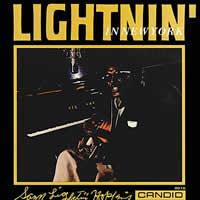Intimate 1960 Candid Hopkins Album Gets AAA Treatment From Pure Pleasure
Today, Houston, Texas seems like one of the last places on earth a bluesman would want to call home (send those emails!), but Sam “Lightnin' “ Hopkins called it home, once he left his small town birthplace, nearby Centerville (population under 1000). His first Houston foray, sometime in the late 1930's, where he accompanied his cousin, the blues singer Alger Alexander, was a bust, so after working on a railroad and singing in the streets he returned home to Centerville.
A second trip to Houston a few years later proved more successful and he managed to attract enough attention to record some sides for Los Angeles based Aladdin records. He returned to Houston and became a street musician and occasional recording artist, traveling to New York and Chicago to go before the microphone.
In the late '50's as folk music boomed, attracting a young generation of fans, Hopkins got to play at a Houston hootenanny before an appreciative white audience for the first time. He made his Carnegie Hall debut October 14th, 1960, sharing a bill with Pete Seeger and Joan Baez, among others.
In his nasty, derisive annotation to this album, music critic and album producer Nat Hentoff, sounding as bilious as an editorial writer for today's Wall Street Journal, craps all over the Carnegie Hall audience, writing “They looked like-and some were-the intense questioners at meetings of the Young Socialist League and the Saturday picketers at Woolworth's.”
Apparently, the crowd's reaction to Hopkins's performance, while appreciative, was not good enough for Hentoff, who said the Hopkins was the only “real” folk singer on the program, “…as distinguished from singers who 'interpret' folk material.” I guess Baez doesn't cut it because she didn't grow up under segregation, in poverty singing in the streets. Therefore, not only does she not rate as a folksinger, but how dare her even protest the conditions under which Mr. Hopkins endured to produce his art? I guess Hentoff worried that more “authentic” folk artists wouldn't be hatched unless we kept these people living in near sub-human conditions.
Pardon my ranting, but reading the effete, snobby notes put me in a foul, disagreeable mood. How refreshing it was to read Dylan's “Chronicles,” in which he admits freely to liking The Kingston Trio and other musical acts that were anything but “pure.” Thankfully though, Hentoff decided we plebes were worthy of hearing Mr. Hopkins's music, because he supervised the recording of this wonderful set at Nola Penthouse Sound Studios in New York, November 15th 1960.
Side two's opener “The Trouble Blues,” a stark distillation of both Mr. Hopkins's life and his art is delivered with brutal intimacy, his fingers delicately caressing the strings of his guitar.
A simple boogie piano tune follows, in which, despite the familiar chording and structure, you can feel both the man's pain and his tender humanity and optimism in the face of tribulation as he wrings a wide range of dynamics from the instrument to express his feelings.
No point in a long winded play-by-play: if you appreciate the simultaneous simplicity and complexity of the blues, you won't want to miss this performance and recording. The miking is intimate, the recording simple, natural and unadorned as it should be for this kind of music. You will be sitting but a few feet from Mr. Hopkins, with no obvious reverb or other studio trickery getting in the way (though a touch of added “space” can be detected).
I've never seen an original Candid pressing but I do have an excellent sounding Barnaby (Z30247) reissue from the early '70's with new liner notes by Chris Albertson that mimics Hentoff's original. The notes claim “Black Cat,” included on the reissue, was not on the Candid original, yet it is included on this Pure Pleasure Records reissue, which uses the original jacket artwork. “Black Cat” is in the track listing.
Pure Pleasure's reissue is richer and fuller than the Barnaby, but the tape has aged over the years and there's a bit less information on top-or the EQ was very differently applied-and so there's less air around the piano, for instance, and immediacy is somewhat curtailed. Still, if I didn't have the Barnaby as a point of comparison, I'd consider this a superb sounding reissue. My copy, unfortunately, though appearing perfect was “crunchy” throughout on both sides, even after repeated vacuum cleanings. Even the Pallas plant has its bad days. Don't let that stop you, though. I'm sure I just got a bad one. It happens.



